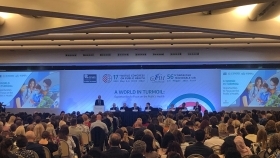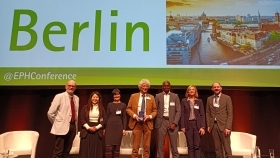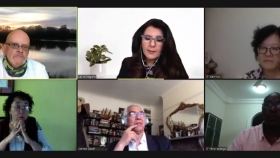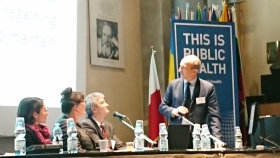
by strengthening education and training
of public health professionals
for both practice and research



The Association of Schools of Public Health in the European Region (ASPHER)
ASPHER is the key independent European organisation dedicated to strengthening the role of public health by improving education and training of public health professionals for both practice and research.Secretariat updates
Download a PDF version of the Statement here.

The public health community expresses our deep concern and solidarity with the people of Lebanon, following the appalling explosion in Beirut of August 4th, 2020. The work of public health professionals is to protect and improve the populations’ health. The current disaster highlights multiple problems contributing to a worsening health catastrophe in Lebanon, requiring urgent international support and solidarity.
Over several decades, Lebanon has been witnessing political, military, and socio-economic turmoil as a result of a sectarian political system, corruption, wars and occupations, and regional conflict. The culmination of these has imposed significant stress on the livelihood of the Lebanese people and their education, social, and healthcare systems.[1] The latest catastrophe occurred on the 4th of August, 2020 when 2,750 tonnes of improperly stored Ammonium Nitrate, which should not have been stored there at all, exploded in the port of Beirut and sent devastating shockwaves across the Lebanese capital, causing widespread destruction to buildings and putting the port out of commission. To date, more than 170 victims have been declared dead, an unknown number are missing, roughly 6,000 have been wounded, and 300,000 have lost their homes.[2]
This tragic explosion has arisen at a time during which Lebanon has been facing a runaway economic collapse beginning in November of 2019, followed by the COVID-19 pandemic which reached Lebanese soil in February of 2020. Further to a shortage of foreign currencies in the Lebanese banking sector, the Lebanese pound has since lost around 80% of its value (inflation of 4.5%); this has resulted in a large and sudden increase in unemployment rates, business shutdowns, and prices of basic goods, medicine, and medical supplies that are imported in majority. With the damaged port put out of service until further notice, and the national wheat supply blown away or contaminated, unless Lebanon receives aid and international support, the economic situation is likely to worsen significantly over the near future.[3]
To make matters worse, the Lebanese economy has been struggling with strict off-and-on COVID-19 lockdowns to curb its spread after the confirmation of its first case in February. During the first strict lockdown period, the Ministry of Public Health and its partners enhanced the preparedness of hospitals by increasing the number of ventilators and hospital beds specific to COVID-19 cases, as well as training personnel, purchasing personal protective equipment, and increasing testing capabilities. Since easing the lockdown in July, COVID-19 cases have increased significantly, resulting in a large number of severe cases requiring hospitalization. This raises major concerns, as the healthcare system is not only threatened by the economic crisis but also by shortages in electrical power and medical supplies.[4,5]
In addition, one must not forget that Lebanon hosts the largest refugee population per capita in the world, with an estimated 1.5 million Syrian refugees and around 200,000 Palestinian refugees under UNRWA’s mandate.[6] Therefore, 30% of the total Lebanese population is composed of migrant workers and refugees residing in underserved camps or informal settlements, and thus require specific attention given their critical political and social situation.[7] In collaboration with the Lebanese government and the concerned United Nations offices in Lebanon, several initiatives were implemented such as testing, distributing hygiene kits, and raising awareness. Even though few COVID-19 cases have been recorded in camps, the vulnerable living conditions of this population poses a major public health threat if cases continue to rise sharply on Lebanese grounds.[7]
After the blast hit Beirut, the Lebanese Health Minister announced on the 6th of August that they expected a huge rise in COVID-19 cases over the 10 days following the explosion.[8] In addition, the explosion has caused significant destruction to four Beirut hospitals and the Ministry of Public Health’s central drug warehouse. Thankfully, the Ministry of Public Health and its partners have managed to move the drugs and vaccines to safe storage rooms across the capital to preserve the stock in good conditions and keep the vaccination services functional in the country.[9] Given all the above factors, the Lebanese health sector is on the verge of collapse, as several hospitals have been damaged in the explosion and others have been overwhelmed with thousands of wounded from the explosion as well as from the violent protests that followed in Beirut. This exposes the healthcare system to an expected spike in COVID-19 cases, which will undoubtedly further overwhelm the struggling hospitals.
Shortly after the explosion, a large number of countries and international organizations expressed solidarity with the Lebanese people through medical and financial donations, rescue teams, and disaster management support.[10] In addition, leaders from France, Germany, United Arab Emirates, USA, and others have visited Beirut to express their support to the people affected by this explosion.
Even though one of the United Nations Interim Force in Lebanon (UNIFIL) ships of the Maritime Task Force docked in Beirut port was damaged, leaving naval peacekeepers injured some which were severely injured, the UNIFIL head of mission and force commander Major General Del Col said: “We are with the people and the Government of Lebanon during this difficult time and stand ready to help and provide any assistance and support.”[11]
Lebanon is located in the one of the most volatile regions in the world. This complex health-economic-political crisis has the possibility to transform into a regional and international crisis with major implications for global health. This is even more dangerous now during the COVID-19 pandemic. Therefore, we must act fast and accordingly to ensure the safety and security of the Lebanese people as well as the rest of the world.
The Global Network for Academic Public Health (Global Network), is a convening body for academic public health leaders from around the world to share, learn, collaborate, to improve, and protect the health of the public and planet. The Global Network is committed to stand in solidarity with, reinforce, and coordinate the efforts of our members and member associations of public health worldwide as well as to make expertise available as requested.
- We call on international organizations to continue to send aid and assistance intended to support the immediate needs of the communities residing in Lebanon (e.g. in the form of medical supplies, personal protective equipment, and personnel) preferably directly to Lebanese non-governmental organizations, without it passing through the government, so as to ensure transparency and accountability;
- We call on governments to stand in solidarity with and maintain foreign aid and assistance, with clear mechanisms for accountability, to the Republic of Lebanon;
- We call on the international community to support the Lebanese government and all governments in the region to maintain peace across their territories and engage with the United Nations and other international bodies to help resolve their conflicts rather than resort to any military action;
- The Global Network calls on regional and national associations, societies, and schools of public health worldwide to continue to mobilize academic support for our public health colleagues and institutions in Lebanon;
- We further call for solidarity across, within, and between continents, countries, associations, and schools of public health in support of the efforts to aid the recovery and peacekeeping efforts in the Republic of Lebanon after this tragedy;
- We call for the international organizations to support the Ministry of Public Health to rehabilitate and reinforce the infrastructure of the central warehouse, primary health care facilities, and non-functional hospitals due to its close proximity to the explosion site.
- We call for the Ministry of Public health and the Ministry of Environment to conduct an environmental assessment on the impact of the hazardous smoke caused by the explosion and exposure to dust and probable toxic chemical and biological hazards from the rubble and destroyed buildings, and raise awareness through particular guidelines on how people can protect themselves from different environmental hazards;
- We call for the Ministry of Public Health and its partners to continue joining their efforts to ensure the containment of COVID-19 through strict measures as cases begin to spike again in order to avoid straining the health care system more than it already has;
- We commend the efforts of civil society and urgently call for the government and international organizations to collaborate and address the country’s food security and nutrition for the Lebanese people, especially the 300,000 who are left stranded with no shelter after the explosion.
Prepared by Brian LH Wong*, Melissa Sawaya, Sandy Laham, Henrique Lopes, Robert Otok, John Middleton*, Association of Schools of Public Health in the European Region (ASPHER), and Iman Nuwayhid, American University of Beirut. Corresponding authors* Brian Li Han Wong, Clinical Epidemiologist, MRC Unit for Lifelong Health and Aging at UCL. John Middleton, ASPHER President.
Global Network endorsements and representatives
Asia-Pacific Academic Consortium for Public Health (APACPH)
Wah Yun Low, President
Association of Schools of Public Health in Africa (ASPHA)
Philip Baba Adongo, President
Association of Schools of Public Health in the European Region (ASPHER)
John Middleton, President
Association of Schools and Programs of Public Health (ASPPH)
Laura Magaña, President and CEO
South East Asia Public Health Education Institutions Network (SEAPHEIN)
Rajendra Surenthirakumaran
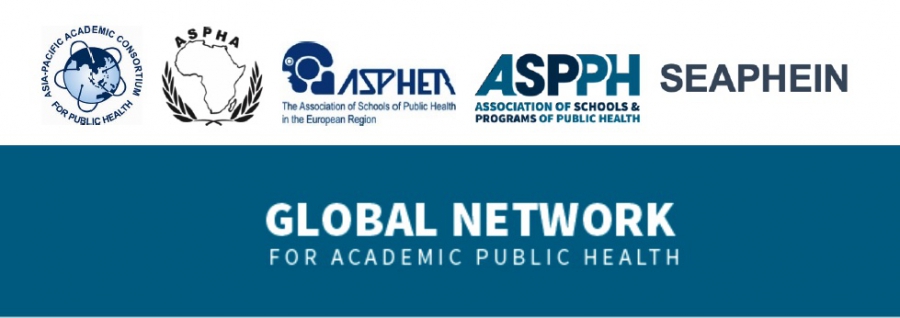
References:
1. Ammar A., Kdouh O, Hammoud R, Hamade R, Harb H, Ammar Z, Atun R, Christiani D, Zalloua P. Health System Resilience: Lebanon and the Syrian refugee crisis. J Glob Health. 2016 Dec; 6(2): 020704.
2. Gardner D. Lebanon: a nation brought to its knees. Financial Times. 2020 Aug 7. Available from: https://www.ft.com/content/0e8aff25-629c-4737-a1dc-8ed4ee32447e
3. The lights go out on Lebanon’s Economy as financial Collapse Accelerates. WP. 2020 July 19. Available from: https://www.washingtonpost.com/world/middle_east/the-lights-go-out-on-lebanonseconomy-as-financial-collapse-accelerates/2020/07/19/3acfc33e-bb97-11ea-97c1-6cf116ffe26c_story.html
4. Ministry of Public Health. Novel Coronavirus 2019. Available from:
https://www.moph.gov.lb/en/Pages/2/24870/novel-coronavirus-2019-5
5. El-Jardali F, Melhem N, Daher N, Jabbour M, Bou Karroum L. K2P COVID-19 Rapid Response Series: Second Wave of COVID-19 in Lebanon: A Call for Action, Knowledge to Policy (K2P) Center. Beirut, Lebanon. 2020 July 27. Available from: https://www.aub.edu.lb/k2p/Documents/K2P%20COVID19%20Rapid%20Response%20Series%20Second
%20Wave%20of%20COVID%20in%20Lebanon%20A%20Call%20for%20Action%20July%2027%202020.pdf
6. UNHCR. Lebanon | Global Focus. Available from: https://reporting.unhcr.org/node/2520
7. Khoury P, Azar E, Hitti E. COVID-19 Response in Lebanon: Current Experience and Challenges in a Low-Resource Setting. JAMA. Published online July 23, 2020. doi: 10.1001/jama.2020.12695
8. John T, Macaya M, Hayes M, Rocha V, Wagner M, Berlinger J, Renton A, Rahim Z and Upright E. Beirut explosion rocks Lebanon's capital city. CNN. 2020 Aug 6. Available from: https://edition.cnn.com/middleeast/live-news/lebanon-beirutexplosion-live-updates-dle-intl/index.html
9. UNICEF. Geneva Palais briefing note on situation for children affected by Beirut explosions and UNICEF response. 2020 Aug 7. Available from: https://www.unicef.org/press-releases/geneva-palais-briefing-note-situation-children-affected-beirut-explosions-and-unicef
10. Reuters staff. This is how different countries are supporting Lebanon after the Beirut explosion. World Economic Forum. Available on: https://www.weforum.org/agenda/2020/08/lebanon-beirut-explosion-aid-support-international-donations/
11. UNIFIL. UNIFIL statement on the explosion in Beirut. 2020 Aug 4. Available from: https://unifil.unmissions.org/unifil-statement-explosion-beirut
Terms of use · Transparency statement ·Tel: +32 2 735 0890 ·Skype: ASPHERskype ·Mail: office@aspher.org ·Share:
ADDRESS
Aspher SecretariatUM Brussels Campus
Av de l'Armée / Legerlaan 10
BE-1040 Brussels


